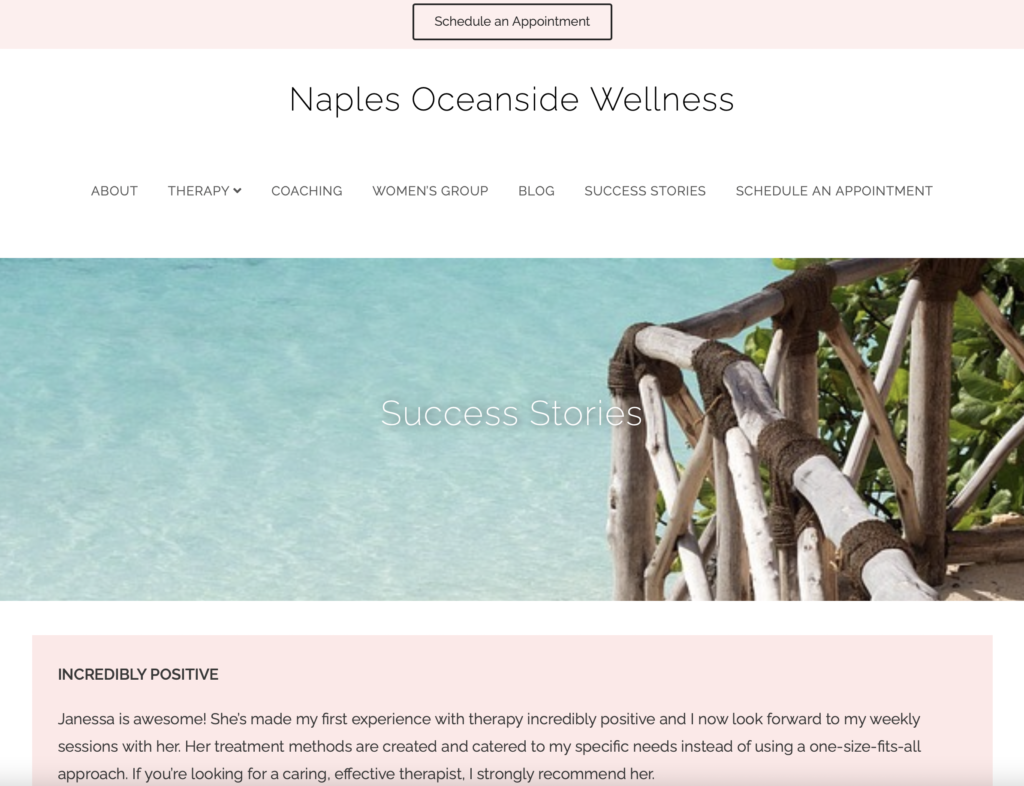
Client testimonials hold the power to showcase the positive impact of your therapy practice. However, there can be important ethical considerations when asking for and using client testimonials for therapists. We hear from a lot of clients, that they aren’t comfortable asking for them, or they have collected some but feel it is inappropriate to put them out into the world. We get it! It is hard to put things out there that may feel like bragging about yourself or your business. There is a fine line between helpful therapist and cheesy salesperson. But used properly client testimonials can be a major boost to your website both on the front end and the back end. So, let’s explore the dos and don’ts of client testimonials for your website.
TME LOVES User-generated content, such as testimonials, can boost your website's search engine optimization (SEO). Positive reviews and testimonials can lead to increased search engine rankings, making it easier for potential customers to find your business online.
The Dos:
1. Seek Informed Consent:
This one may seem like a no brainer but being upfront and honest with your clients before you even ask can go along way for your comfort levels and theirs! Before requesting a testimonial, obtain explicit and informed consent from your client. Explain how their testimonial will be used, where it will be shared, and the potential reach. You can also provide a way for your client to do their testimonial anonymously if they are worried about judgement from their peers. As always, it is important respect their decision if they choose not to provide a testimonial and understand it may not have anything to do with your abilities to treat them.
2. Maintain Anonymity and Confidentiality:
Protect your client’s privacy by avoiding the use of identifying information in the testimonial. You can talk to them and discuss how they would feel most comfortable with their testimonial being published. Maybe it is anonymously or maybe it is with only a first name. Some clients may have no hesitation or boundaries and others may be very guarded.
3. Encourage Honesty:
Encourage clients to provide honest feedback based on their experience. Authentic testimonials are more valuable and trustworthy to potential clients than overly polished or scripted ones. This alone will help you avoid those scary salesperson vibes. I know you can think of a few!
4. Highlight Transformation:
When asking for the testimonals and discussing that with a client, help them focus on their personal growth, coping strategies they’ve learned, and the positive changes they’ve experienced through your guidance. That gives your clients a bit of a starting point and may help them realize how far they have come as they write it out. That is a win win for everyone!
5. Use Testimonials for Education:
Consider using testimonials to educate your audience about the therapeutic process you use and outcomes you’ve seen. Their may be testimonials you only use for professional development uses in trainings, presentations, or supervision. That is a ok too! (just remember those usually aren’t out in the world for others to see so it won’t boost your SEO)
6. Diversify Your Testimonials:
If possible, collect testimonials that represent a range of therapeutic practices and outcomes. Breaking them up like these means you can put specific testimonials on your service pages of your website that may help future clients relate better and reach out. This diversity also provides a more comprehensive picture of your practice. A great example is the Success Stories page we created for our client Naples Oceanside Wellness (below).
Testimonials add a human element to your online presence. They show that real people have had positive experiences working with you, making your business more relatable and approachable.
The Don’ts:
While there are so many positives and things you should do to collect testimonials, we can’t forget our boundaries!
1. Avoid Coercion or Pressure:
Never coerce or pressure a client into providing a testimonial. Which may be what’s holding you back now. It is easy to get tongue tied when asking for the first time so maybe allow gentle reminders of how they can submit testimonials in your office instead of directly asking if you’re worried! Testimonials should be voluntary expressions of gratitude and satisfaction, not obligations.
2. Don’t Exaggerate or Manipulate:
Resist the temptation to exaggerate or manipulate testimonials to create a certain image. We have seen this before, where a testimonial has been edited and loses the appeal of authenticity. Authenticity is key to maintaining trust with potential clients.
3. Steer Clear of Oversharing:
While you want to demonstrate your effectiveness, avoid sharing overly personal or sensitive details from a client’s therapy journey. If a client submits a very detailed testimonial it may be easier to use that testimonial for your education purposes instead of your website. It is imperatie that you maintain professional boundaries at all times, even when a testimonial may not. It’s ok to not use those.
4. Don’t Promise Specific Outcomes:
Testimonials should not promise specific outcomes to potential clients. Avoid language that guarantees results, as therapy outcomes are complex and individualized. This seems like a big “DUH” statement but it has to be said. Testimonials are not guarantees from clients that all outcomes are the same. Everyone is different, testimonials are just there to help someone relate or feel comfortable reaching out.
5. Avoid Financial Incentives:
Refrain from offering financial incentives in exchange for testimonials. (INSERT FACE PALM GIF) We are covering all those bases of ethics in this article and it has to be said, you should never be in a position that you NEED testimonials badly enough to pay for them. This practice can create ethical conflicts and undermine the authenticity of the testimonials.
Client testimonials for therapists are valuable tools for showcasing the effectiveness of your therapy practice, but they must be collected and used ethically. Prioritize transparency, confidentiality, and authenticity throughout the process. By following the dos and don’ts outlined in this guide, you can leverage testimonials to build trust, educate potential clients, and provide a glimpse into the positive impact of your therapeutic guidance.
Aren't sure where to start? Do you have a collection of testimonials and you aren't sure where to put them or how to use them? We got you!


